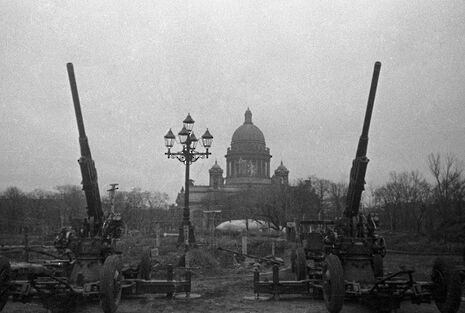The Leningrad Symphony
An exploration of the political and musical reception and significance of Shostakovich’s Seventh Symphony

Completed during the siege of Leningrad, Shostakovich’s Seventh Symphony has an uncertain place in the history of political music. After its first performance in 1942, many Russians greeted it with enthusiasm (not easy considering the cold and hunger they suffered) while Virgil Thomson, working for The New York Herald Tribune, wrote that, “it seems to have been written for the slow-witted, the not very musical and the distracted”. After hearing it on American radio, all Rachmaninoff could say was “now, let’s have some tea”. Musicologists today agree that parts of the symphony are deliberately anti-music, but are they anti-Hitler or anti-Stalin?
The question is asked mostly in response to the first movement and its famous ‘invasion’ theme. The Siege of Leningrad lasted 900 days and one needs about the same amount of time to hear the first movement. It is apt that Shostakovich was the first major composer who was educated entirely within the USSR: any drummer performing the piece had better belong to a good workers’ union, because he’ll be playing the same thing for hundreds of bars straight. Soviet critics thought that the first movement represented the invading Nazis, and later critics have recognized that its triteness is supported by quotations from Franz Lehár’s sentimental operetta The Merry Widow, which was one of Hitler’s favourite pieces of music. Under Gorbachev, however, Lev Lebedinsky, a close friend of Shostakovich, claimed that Shostakovich had written the theme with Stalin in mind, and called it the anti-Hitler theme only after the invasion of Russia. The gradual crescendo of the theme could be imitating the invading army coming closer or a gradual takeover from within; the bombastic caricature could be one of Stalin and the Soviet Union. As with the anti-Hitler reading, quotations support the anti-Stalin reading: in the first movement Shostakovich quotes from his own opera Lady Macbeth of the Mtsensk District.
On 26th January 1936, Stalin and his cronies saw a production of Lady Macbeth of Mtsensk District and left silently before the end. The next day in Pravda, the official newspaper of the Soviet Union’s Communist Party, an anonymous article appeared scolding the opera’s music and libretto. The article called it “muddle instead of music” and warned the composer that, for him, “it might end very badly”. The opera was banned until 1961, when it reappeared in a revised form, and for the rest of his life Shostakovich lived with the fear of coming to a “bad end”.
His Fifth Symphony revived his reputation. After its premiere in 1937, it was applauded by both critics and the public. The doctrine of socialist realism demanded that art be life-affirming and triumphant, and these were the qualities the critic Alexei Tolstoy found in the Fifth Symphony, writing that its finale provided an “enormous optimistic lift,” and that the audience is “organically incapable of accepting decadent, gloomy, pessimistic art. Our audience responds enthusiastically to all that is bright, clear, joyous, optimistic, life-affirming.”
Like the Seventh Symphony, the Fifth Symphony inspired contradictory interpretations. The head of the Soviet Writers’ Union, Alexander Fadeyev wrote in his diary that the ending of the last movement does not sound like victory but rather like “a punishment or vengeance on someone. A terrible emotional force, but a tragic force. It arouses painful feelings.” Myakovsky wrote to his fellow composer Prokofieff expressing his shock that Shostakovich could have written a finale so “utterly flat,” and the “official” Soviet critic Georgiy Khubov emphasized the slow movement’s “torpor”.
These accounts allow for the sympathetic interpretation that Shostakovich wrote bad music deliberately in order to comment on Stalin and the Soviet Union. What that comment is nobody can really say, and biography doesn’t help us: while the Soviet administration denounced him for a second time in 1948, in 1949 Shostakovich represented the USSR at the Peace Congress in New York and at similar events in Warsaw and Vienna in 1950 and 1952. From 1939 to 1948 he was a member of the directorate of the Union of Soviet Composers and later served as the first secretary of its Russian branch. He accepted the Order of Lenin in 1956 and 1966, as well as the Lenin Prize in 1958. While his acceptance of these honours could be seen as an acceptance of the Soviet Union, and hence – by our standards – a failure, he might have rejected the Soviet Union through his other failures: a deliberately flat final movement and an unbearably bloated first one.
 News / Colleges charge different rents for the same Castle Street accommodation2 March 2026
News / Colleges charge different rents for the same Castle Street accommodation2 March 2026 News / King’s hosts open iftar for Ramadan3 March 2026
News / King’s hosts open iftar for Ramadan3 March 2026 Theatre / Lunatics and leisure centres 4 March 2026
Theatre / Lunatics and leisure centres 4 March 2026 News / Angela Merkel among Cambridge honorary degree nominees27 February 2026
News / Angela Merkel among Cambridge honorary degree nominees27 February 2026 News / News in Brief: waterworks, wine woes, and workplace wins 1 March 2026
News / News in Brief: waterworks, wine woes, and workplace wins 1 March 2026








